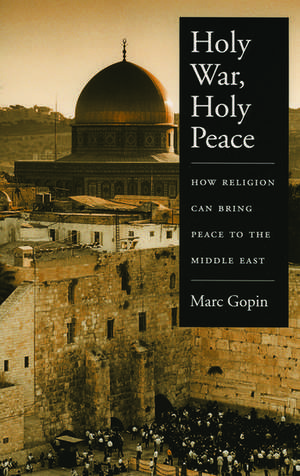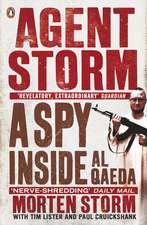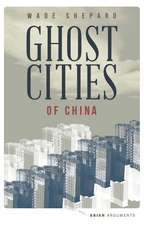Holy War, Holy Peace: How Religion Can Bring Peace to the Middle East
Autor Marc Gopinen Limba Engleză Paperback – 10 mar 2005
| Toate formatele și edițiile | Preț | Express |
|---|---|---|
| Paperback (1) | 225.89 lei 31-37 zile | |
| Oxford University Press – 10 mar 2005 | 225.89 lei 31-37 zile | |
| Hardback (1) | 359.69 lei 31-37 zile | |
| Oxford University Press – 25 apr 2002 | 359.69 lei 31-37 zile |
Preț: 225.89 lei
Preț vechi: 245.35 lei
-8% Nou
Puncte Express: 339
Preț estimativ în valută:
43.22€ • 45.13$ • 35.77£
43.22€ • 45.13$ • 35.77£
Carte tipărită la comandă
Livrare economică 25-31 martie
Preluare comenzi: 021 569.72.76
Specificații
ISBN-13: 9780195181036
ISBN-10: 0195181034
Pagini: 288
Dimensiuni: 234 x 156 x 19 mm
Greutate: 0.4 kg
Ediția:Revised
Editura: Oxford University Press
Colecția OUP USA
Locul publicării:New York, United States
ISBN-10: 0195181034
Pagini: 288
Dimensiuni: 234 x 156 x 19 mm
Greutate: 0.4 kg
Ediția:Revised
Editura: Oxford University Press
Colecția OUP USA
Locul publicării:New York, United States
Recenzii
"A helpful resource for all those sengaged in interfaith and intercultural relations, even apart from Middle East conflict. The book's greatest contribution is the graphic evidence that local peace and reconciliation efforts really do matter."-- Pro Ecclesia
"[Gopin's] passion for peacemaking has produce a gift to all who yearn for an end to the cycle of destructiveness in Israel and Palestine." -- Theological Studies
"Gopin's inventive integration of ancient religious values into a practical social-psychology diplomacy makes Holy War, Holy Peace a must read for anyone interested in the ongoing crisis. This book is a breakthrough in the analysis of the Israeli-Palestinian conflict."-- Journal of Church and State
"Unique and brilliant."--CHOICE
"An ambitious, visionary, and often inspiring book. It reveals possible avenues for peace building and reconciliation, grounded in three great Middle Eastern religious traditions. Gopin's work merits serious attention from all who lament past failures of the many official mediators who have struggled unsuccessfully to help achieve a durable Israeli-Palestinian peace." -Samuel W. Lewis, U.S. Ambassador to Israel, 1977-1985; President, United States Institute of Peace, 1987-1993
"For twenty years Marc Gopin has stood in the gap between Israleis and Palestinians. He writes as one who has been there, on the ground, with people high and low, practicing a combination of courage, empathy, modesty, realism, and hope are rare among Middle East commentators. Diplomats, politicians, and educators who yearn for peace among the 'Abrahamic peoples' should read this book. It will show them how the Abrahamic religions can become a taproot of that peace." -Donald W. Shriver, Jr., author of An Ethnic for Enemies: Forgiveness in Politics
"In the age when most proponents of conflict resolution would discount or even ignore the role religions can play in generating peaceful resolution of conflict, Marc Gopin has most convincingly argued for restoring religious and cultural analysis at the center of deliberations for resolving deadly conflicts. This book fills a critical gap in the study of conflict resolution in a region of the world plagued by an endless cycle of violence. It is essential reading for both Israelis and Palestinians to arrest further mutual incriminations and exclusions in order to usher the period of peace, at least, for the future generations of Jews and Arabs in the region." -Abulaziz Sachedina, author of The Islamic Roots of Democratic Pluralism
"U.S. academic Marc Gopin specializes in conflict resolution. He has written extensively on the subject and practised it in the Middle East for 20 years, facilitating peace initiatives between religious groups "in Israel and Palestine." Where most observers might say religion was the cause of the problems in the Middle East, Gopin says religion is the route to peace. He cites the traditions and myths of the three major religions in the region, and adds his personal experiences, to demonstrate innovative approaches to peace. Gopin may be dismissed as naive, but he moves carefully from theory to practical application." --Globe and Mail
"Yet this new book by an American rabbi with years of experience in grass-roots conflict resolution in the region offers such a fresh angle from which to view the struggle that it demands attention....his visionary analysis and imaginative proposals suggest there are human resources that haven't been called upon adequately....Gopin's prescriptions ring true as a legitimate, life-affirming, even hopeful complement to official negotiations. They may, in fact, be essential before negotiations can genuinely become fruitful."--Christian Science Monitor
"[Gopin's] passion for peacemaking has produce a gift to all who yearn for an end to the cycle of destructiveness in Israel and Palestine." -- Theological Studies
"Gopin's inventive integration of ancient religious values into a practical social-psychology diplomacy makes Holy War, Holy Peace a must read for anyone interested in the ongoing crisis. This book is a breakthrough in the analysis of the Israeli-Palestinian conflict."-- Journal of Church and State
"Unique and brilliant."--CHOICE
"An ambitious, visionary, and often inspiring book. It reveals possible avenues for peace building and reconciliation, grounded in three great Middle Eastern religious traditions. Gopin's work merits serious attention from all who lament past failures of the many official mediators who have struggled unsuccessfully to help achieve a durable Israeli-Palestinian peace." -Samuel W. Lewis, U.S. Ambassador to Israel, 1977-1985; President, United States Institute of Peace, 1987-1993
"For twenty years Marc Gopin has stood in the gap between Israleis and Palestinians. He writes as one who has been there, on the ground, with people high and low, practicing a combination of courage, empathy, modesty, realism, and hope are rare among Middle East commentators. Diplomats, politicians, and educators who yearn for peace among the 'Abrahamic peoples' should read this book. It will show them how the Abrahamic religions can become a taproot of that peace." -Donald W. Shriver, Jr., author of An Ethnic for Enemies: Forgiveness in Politics
"In the age when most proponents of conflict resolution would discount or even ignore the role religions can play in generating peaceful resolution of conflict, Marc Gopin has most convincingly argued for restoring religious and cultural analysis at the center of deliberations for resolving deadly conflicts. This book fills a critical gap in the study of conflict resolution in a region of the world plagued by an endless cycle of violence. It is essential reading for both Israelis and Palestinians to arrest further mutual incriminations and exclusions in order to usher the period of peace, at least, for the future generations of Jews and Arabs in the region." -Abulaziz Sachedina, author of The Islamic Roots of Democratic Pluralism
"U.S. academic Marc Gopin specializes in conflict resolution. He has written extensively on the subject and practised it in the Middle East for 20 years, facilitating peace initiatives between religious groups "in Israel and Palestine." Where most observers might say religion was the cause of the problems in the Middle East, Gopin says religion is the route to peace. He cites the traditions and myths of the three major religions in the region, and adds his personal experiences, to demonstrate innovative approaches to peace. Gopin may be dismissed as naive, but he moves carefully from theory to practical application." --Globe and Mail
"Yet this new book by an American rabbi with years of experience in grass-roots conflict resolution in the region offers such a fresh angle from which to view the struggle that it demands attention....his visionary analysis and imaginative proposals suggest there are human resources that haven't been called upon adequately....Gopin's prescriptions ring true as a legitimate, life-affirming, even hopeful complement to official negotiations. They may, in fact, be essential before negotiations can genuinely become fruitful."--Christian Science Monitor
Notă biografică
Marc Gopin, author of Holy War, Holy Peace (Oxford, 2002), is a Senior Associate in the Preventive Diplomacy Program of the Center for Strategic and International Studies in Washington D.C, Visiting Associate Professor of International Diplomacy at Tufts University's Fletcher School of Law and Diplomacy, and a Senior Researcher at its Institute for Human Security.













